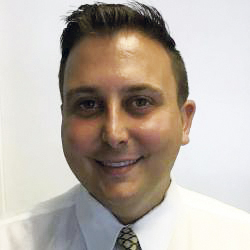Certified Professional Insurance Agents share the value of their designation
And we’re back. That’s a frightening picture above, isn’t it? Let’s begin, shall we?
Recapping from the introduction installment, the Certified Professional Insurance Agent (CPIA) was created by the American Insurance Marketing and Sales (AIMS) Society. The CPIA is the industry’s only sales-based designation, divided up into three one-day courses: Position for Success (CPIA 1), Implement for Success (CPIA 2) and Sustain Success (CPIA 3). The classes are hands-on and group focused.
“It wasn’t one of those classes where they have a PowerPoint and you sign off at the end of the day that you were there,” says Kelley Carter, CPIA, vice president of marketing at Choice Insurance Agency in Virginia Beach, Virginia. “The instructors had been in the industry for 20-plus years; one had owned and operated his own agency for 20-25 years. The insight and the coaching you were getting weren’t just from a book or a PowerPoint presentation but were directly from people who had done the stuff and done it well.
“They put you in interactive situations,” Carter continues. “You did role playing with other members of the class and you came up with marketing ideas and ways to hone your message. It was extremely hands on.”

—Kelley Carter, CPIA
Vice President of Marketing
Choice Insurance Agency
“It was a great program with a lot of dialogue; I thought the material was excellent,” adds Nicholas Ruickoldt, CPIA, CISR, an agent at The Russell Agency in Southport, Connecticut. “In the classroom there was a lot of working in groups and hearing from different agents. You learned a lot from not only the curriculum but from the other attendees; I thought that was probably the best part of the class—hearing what other people were going through, their challenges and how they overcame them.
“Being my fifth year in the business when I earned the designation, there were people newer than me and experienced veterans. It brought together a lot of different people from different backgrounds. That experience made it very impactful to me personally.”
“The main thing I took from the CPIA courses was a specific piece of the program we worked through,” says R. Matt Gardner, CPIA, CIC, an agent at Mitchell Insurance Agency, which has locations in Ohio, Kentucky and Florida. “You’ve made the sale but how do you retain the client? And it wasn’t retention down the road, but how to get in front of and touch these clients to make them a client for life from the get-go. It discussed having a certain number of touches, whether by mail, email, or phone call during the first six months to a year, leading up to when that first renewal comes up. At the time I took the class, I’d been writing business for years and had never really implemented something like that.
“I had gone to the CPIA courses with two other agency colleagues and we said we needed to implement this; we call it our welcoming program,” he adds.
“One of the instructors was talking about going into a client meeting and turning the meeting around—having a sales conversation with someone who might not want to take the appointment with you,” adds Carter. “He ran through a few scenarios and we role played what it would be like to go to that meeting. When I came back to the agency, I ran into a situation where I could directly apply that within two or three weeks.”
Benefits
Similar to our previously discussed designations, participants in the program say that the benefits of obtaining a CPIA are well worth the time and effort.
Kelley Carter started in the insurance field in 2012; her first niche market was home insurance. With the location having a call center atmosphere and wanting a more face-to-face approach with clients, she left her job and started at The Braun Agency in Virginia Beach, Virginia, the following year. Already having her personal lines license, she would earn licenses in life/health/annuity and commercial lines. With undergraduate degrees in communications and public relations, Carter migrated to the agency’s marketing side.
“As I was having opportunities to grow within the company, I went to Richard Braun, the owner, and told him I wanted to make sure I really knew my stuff and that I wanted to be excellent in my field,” says Carter. “There happened to be a CPIA class in Richmond coming up, so I drove up for three days and knocked out all three courses; my employer paid 100% of the class for me.
“I earned the designation in 2015,” she continues. “Being new in the industry when I started and jumping in with both feet, my goal was to get as much knowledge and expertise and grow as quickly as I could. I do a lot of speaking engagements, Lunch and Learns, and guest speaking for different organizations. Having a designation behind my name lends a lot of credibility. It’s amazing how people view that little bit of extra effort to gain knowledge.”
Carter started her current position with Choice Insurance Agency at the start of the New Year.
Nicholas Ruickoldt entered the insurance field as an intern in college, working in both Connecticut and Boston, Massachusetts. He started at the Russell Agency in 2008 and has held several positions on the agent association side through the Professional Insurance Agents (PIA) organization; he was their National Young Insurance Professional of the Year award winner in 2015 (see the September 2015 issue of Rough Notes).
“I earned the CPIA in 2014; my employer paid for the classes, scheduled them and allowed me the time off,” Ruickoldt says. “There were three courses, each in a different location across the state. It was a good mix of different people with different backgrounds.

—R. Matt Gardner, CPIA, CIC
Agent
Mitchell Insurance Agency
“Having a designation helps show that you’re a professional, that you take the business seriously and are willing to put the time in to further your development in your career, which clients see as a benefit when they’re deciding to do business with somebody. I display my CPIA on my public profiles and business card; I take a lot of pride in it. I definitely find that it’s a competitive advantage when you can look beyond the premium on a page and look at the individual and their agency, when that individual has reached a certain level of proficiency in their field.”
Matt Gardner earned his CPIA in 2012. “It was offered and supplemented by Grange Insurance—one of our carriers who sponsored it,” Gardner says. “They paid for a portion and then the agency paid for the remainder. Our agency values education. If you’re going to class in pursuit of a designation that we deem valuable, the agency pays for it in full.”
He entered the insurance industry 14 years ago after his previous job in a different career was wanting him to relocate.
“My wife and I wanted to stay where we were to raise a family,” Gardner explains. “I started looking and ended up here; I’m still at the agency where I started my insurance career. When I started 14 years ago, we had two offices and eight employees. We now have five offices and 30 employees. We’ve grown quite a bit.”
Gardner started by servicing clients mainly in personal lines, with some business in commercial lines. He transitioned to writing both personal and commercial lines before adjusting to his new position of managing outside producers.
“You constantly have to be getting better and adapting to how your customers want to be dealt with and communicated with,” Gardner says. “The CPIA helped my career because I was able to be in a place with other agents who had other ideas. All of the things that you learn—even the stuff that you already knew—you’re getting reassurance from professionals teaching the class. It helped my career in the sense that it helped my agency with retention, increased sales, and how to better communicate with our clients.”

—Nicholas Ruickoldt, CPIA, CISR
Agent
The Russell Agency
Advice
Still contemplating working toward a CPIA designation?
“I’d encourage anybody to try to obtain any designation pertinent to their career; obviously if you’re not selling life insurance, you don’t need to get your LUTCF,” says Gardner. “The education that you receive and the techniques that they help you with—from prospecting to the sales process to the retention process—are worth it.
“I had been doing the work for seven or eight years and there was stuff from the course that I didn’t know,” he adds. “It’d be great for a new agent.”
“Go for it; I gained so much insight from it,” adds Carter. “They give you the tools you need and you come away with strong takeaways that you can apply immediately.”
“On top of your CE that’s required, it’s extremely important to always keep learning,” says Ruickoldt. “It’s like saying, ‘Back when I was 18, I went to the gym every day.’ I’m 30; I can’t rely on what I did when I was 18, and I think it’s important for insurance professionals—along with your licensing and CE requirements—to always stay ahead and look to get to as much education and information to pass along to a client. At the end of the day, that’s what we’re here to do, to serve our clients the best that we can.
“In terms of designations, the CPIA is a wonderful one to continue your growth as an insurance professional. There’s a lot of information provided with it and a lot of resources, whether it’s business income calculators, sales tips, or prospecting methods. It’s not a ‘you get it and you’re done’; it’s a continual fluid designation.”
More designations will follow in future issues. Until next time, keep watching the skies.
For more information:
The AIMS Society
www.aimssociety.org
By Christopher W. Cook






